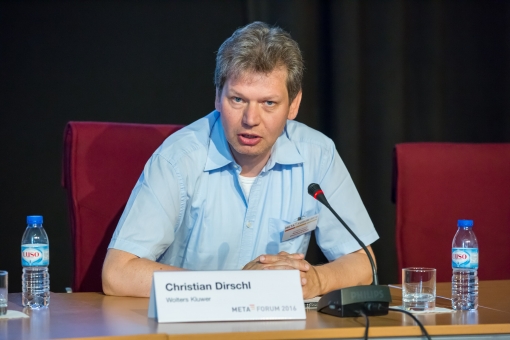
What is your focus of interest?
I am head of content strategy at Wolters Kluwer Germany. We are an information service provider and we are using semantic web technologies in our backend systems for quite some time already. I am currently active in the H2020 ALIGNED project, where we try to solve some basic problems when it comes to data-intensive big data systems. I am also chairing the W3C rax community group, which is developing practical solutions for people, who want to use both XML and RDF in their data processes. And last but not least, I am chair of SEMANTiCS industry track for some time, which gives me a lot of insight into current trends and developments.
My current focus of interest is on the one hand to bring semantic web technologies more broadly into industrial usage – both in my own company and industry, but also on a general level. I think that the basis for this is laid, but we need more knowledge transfer on what to do, what to avoid and how to do it. Second, we need to better figure out how a constructive and fruitful collaboration between semantic web people, BI people, Big Data and AI (including NLP) communities, as well as software development in general can be achieved. Unfortunately, we are not yet where I think we all should be in this respect. And last thing is that we need to become much clearer on what the upcoming data economy actually means and how we can successfully manage the challenges – I assume I do not have to mention recent developments, which will make things even harder in the future.
Which trends and challenges do you see in linked data / semantic web?
I think that the hype around Semantic Web back in 2010 is now replaced by the hype around Big Data and AI. This is not necessarily a bad thing, because quite a few challenges that these new developments face need contributions from Semantic Web and Linked Data technologies in order to achieve their goals, especially with respect to quality and sustainability.
In addition, there are two more encouraging trends going on, which makes me optimistic for the coming years. First, in some industries – especially content-intensive ones - semantic web has already found its way into core IT systems of large companies with respect to data processing, but also increasingly with respect to enterprise data integration tasks. So Semantic Web is already beyond being a good idea, it is part of the tech stack that industry needs. Second, and this is also a tribute to this year’s hosting country The Netherlands, Open Data initiatives are in some areas having a major impact on the transformation towards digital business and a single digital European market.
The challenges are still the same. Since Semantic Web addresses complex challenges, the technology is complex and we need more usage and openness and a lot of knowledge sharing within industry, but also with academia to master them successfully. I think that SEMANTiCS is a perfect place for doing exactly this.
What are your expectations on Semantics 2017?
I am very happy that this year’s SEMANTiCS takes place in Amsterdam. It is not only a very attractive conference venue for industry, it has also been a focal point of semantic web and especially Open Government Data for a long time. So I think the Dutch semantic web community has a lot of exciting stories to tell. We are addressing this by introducing this year a specific Data Science track, which will focus on the Data Analytics and Visualization. We know that these topics are of special interest for participants from industry. We are also offering hands-on extended sessions, where direct communication between industry people with a lot experience in applying semantic web technologies and others who are new to this field is initiated and professionally moderated by knowledge management experts – this format was very successful last year and we will definitely continue to develop the conference toward an applied and industry-focused conference on semantic topics.
Christian Dirschl
Chief Content Architect at Wolters Kluwer Germany